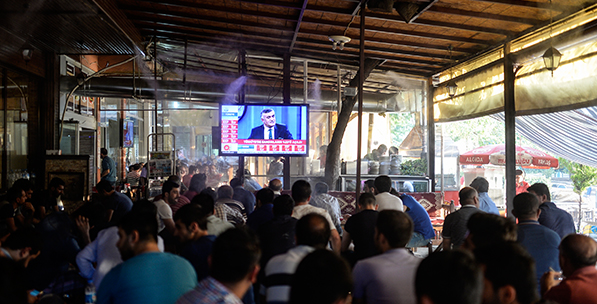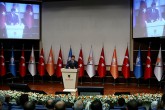In the week before the elections, several prominent analysts of Turkish politics and foreign policy met their Russian colleagues in Moscow with the joint organization by the Daily Sabah Centre for Policy Studies and the Carnegie Moscow Center in order to discuss the upcoming elections in Turkey and the possible ramifications and prospects of Turkish-Russian relations. In addition to the lively debate on Turkish politics, once again in a meeting on Turkey the foreign policy choices of the Turkish government and its relations with its neighbors resulted in a stimulating debate among participants. The presentations, panels and debates demonstrated major challenges as well as opportunities in bilateral relations between Russia and Turkey.
Relations between Turkey and Russia have constantly been underemphasized and understudied since the end of the Cold War. Despite vibrant economic relations between the two countries and an increasing degree of social and cultural rapport via the constant movement of goods and services along the borders, the nature of relations between the two countries has not been very well discussed in academic and policy circles. The relations are instead mostly left on the autopilot of social-economic ties, and in regard to the issues of mutual importance, including the crisis in the Balkans and Chechnya in the 1990s, the two countries avoided directly confronting each other in the international arena. However, for the last few years the number of areas of potential cooperation as well as potential dispute increased rapidly. On the one hand, the two countries started to have diverging and even contrasting positions on regional problems. These divergences increased dramatically due to developments in the Middle East and the crisis between Russia and Ukraine. In particular, the crisis in Syria and the military assistance and diplomatic support of the Russian government to Syrian President Bashar Assad’s regime generating a major crisis of confidence in political relations between the two countries. As the number of casualties increases in Syria, the destructive impact of the war is changing its nature and instead of being a tension between two governments, it also starts to impact public opinion in Turkey about Russia. A similar but less emphasized crisis took place as a result of the conflict between Russia and Ukraine in the last two years. Turkey and Russia once more found themselves on different sides and the Turkish sensitivity to the territorial integrity of countries in the region caused another stumbling block in bilateral relations. These differences are difficult to overcome and a more stable and effective Turkish-Russian relationship necessitates the improvement of bilateral ties in the areas of strategic and political relations. In the absence of such a stabilizer, the disagreements between the two countries regarding these two crises may also result in more peripheral crises in other potential areas of dispute. Such a spread of areas of tension between the two countries will not only destroy their social-economic relations but could also make strategic challenges more difficult to overcome. Statements from the Russian government about the historical disputes between Turkey and Armenia last April and Turkey’s reaction to these statements was a demonstration of the consequence of the extension of the crises in Syria. The recent debates about the energy agreements between the two countries, including the Akkuyu nuclear facility and debates about the Turkish Stream gas pipeline may contribute to the stabilization of bilateral relations. The meeting between President Recep Tayyip Erdoğan and President Vladimir Putin last week demonstrated the potential role that the leaders can play in fixing bilateral relations, however in the absence of rapprochement between the position of two countries regarding Syria, these relations will always be prey to the developments in this country. It would be harder to keep public relations between Turkey and Russia at the same level in the absence of a po



